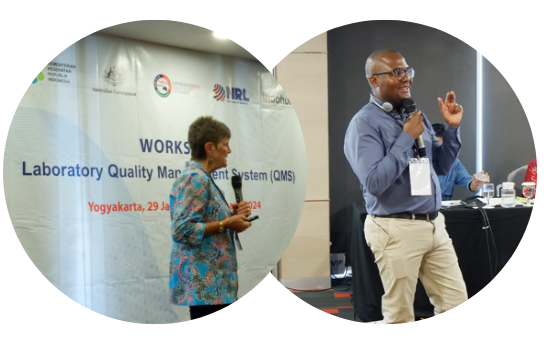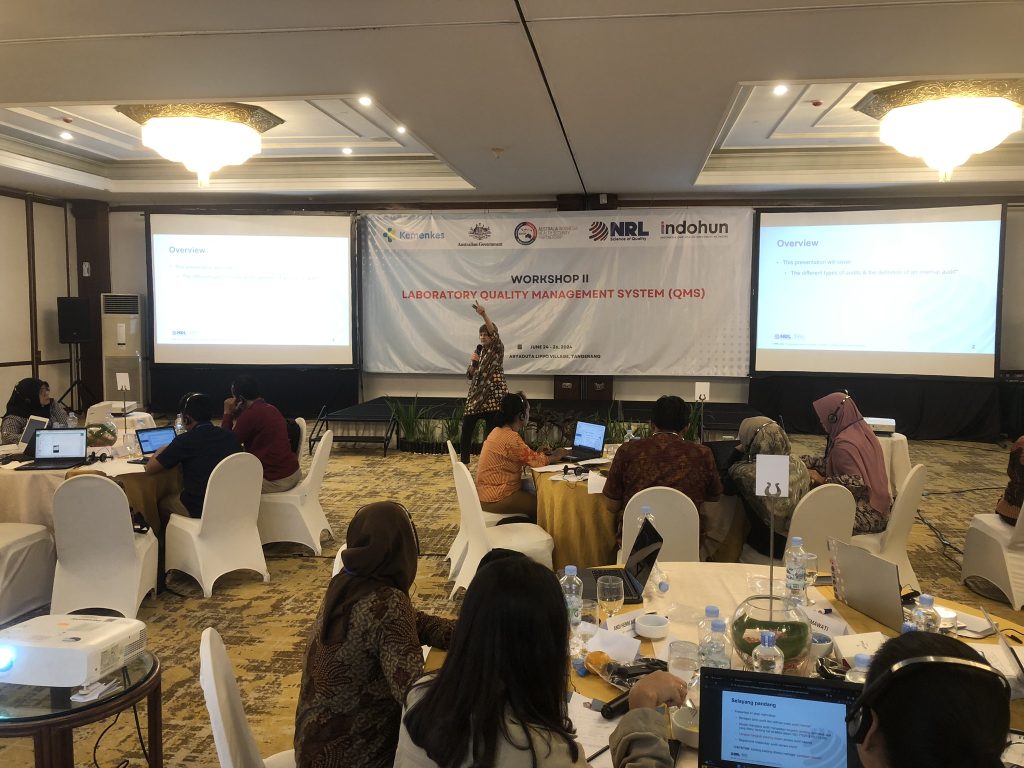Posted: February 2024
News-
Overview
In collaboration with Australia Indonesia Health Security Partnership (AIHSP) and The Indonesia Health University Network (INDOHUN), the NRL Scientific Consulting and Training (SCT) team have been implementing a laboratory capacity building and strengthening program in Indonesia.
The program focuses on strengthening the implementation of quality management systems (QMS) in primary health, district health and provincial health laboratories in 5 provinces. The goal is to improve the quality of testing in these laboratories and equip them to provide reliable diagnostic testing for both clinical diagnosis and public health surveillance purposes.


NRL trainers Innocent Mupunga Vee Armstrong presenting a workshop on Laboratory Quality Management Systems (QMS) in Yogyakarta in Q1 2024. Participants of the QMS training.
Session 1Our Scientific Consulting and Training team held their first training workshop in Indonesia – Here’s the updates
In late January, the SCT held the first face-to-face training workshop in Yogyakarta over 5 days. The objectives were to provide an overview of laboratory QMS, focusing on its use in identifying and managing risks to the quality and accuracy of test results and outlining the principles behind the key QMS activities that form the foundation for the QMS. The team also visited some of the laboratories to gain firsthand appreciation of the scope of work, workflows, available resources, and challenges faced by the laboratories.
The workshop was attended by quality champions selected from participating laboratories; observers from the reference laboratories, Ministry of Health, and the Health Training Centre (CILOTO); and representatives from both INDOHUN and AIHSP.
The team appreciates the logistical and technical support provided by both AIHSP and INDOHUN to make the workshop a success.
Session 2Our Scientific Consulting and Training team held their second training workshop in Indonesia – Here’s the updates

The NRL Scientific Consulting and Training (SCT) team is implementing a laboratory capacity building and strengthening program in Indonesia in collaboration with Australia Indonesia Health Security Partnership (AIHSP) and The Indonesia Health University Network (INDOHUN). The program focuses on strengthening the implementation of quality management systems (QMS) in primary health, district health and provincial health laboratories in 5 provinces. The goal is to improve the quality of testing in these laboratories and equip them to provide reliable diagnostic testing for both clinical diagnosis and public health surveillance purposes.
In late June, the SCT held the second face-to-face training workshop in Tangerang over 3 days. The workshop was attended by quality champions selected from participating laboratories; observers from the reference laboratories, Ministry of Health (MOH), and the health training centre (Balai Besar Pelatihan Kesehatan, BBPK); and representatives from both INDOHUN and AIHSP. The training program for workshop 2 was designed to provide advanced training on topics that had been requested by participants or identified as part of previous activities. As part of the expected training outcomes participants were expected to:
- Improve their understanding of risk assessment processes and creation of risk registers;
- Understand how to identify opportunities for improvement and the importance of doing so;
- Be able to use Training Checklists as part of the design and delivery of training to staff;
- Understand the similarities and differences between good clinical laboratory practice and a QMS based on ISO 15189;
- Improve their knowledge of the management of nonconformities, including the importance of performing root cause analysis;
- Understand the importance of internal audits and how to plan for an internal audit;
- Gain a better understanding of the principles of laboratory biosafety and biosecurity, including the need to perform safety assessments.
The team also held meetings with key stakeholders, including representatives from MOH, BBPK, AIHSP and INDOHUN. The team also appreciates the logistical and technical support provided by both AIHSP and INDOHUN to make the workshop and stakeholder meetings a success.